The world's political situation is dramatically shifting in an uncertain direction. The NATO powers are bewildered, specifically in the context of their dismal failure to tackle the crisis of Covid-19.
Two major problems in the scene are significant. (a) By meticulously dumping wealth in the pockets of a negligible number of people, crony capitalism has severely weakened Euro-American economies, and (b) the development of science and technology in the sphere of human lives—the health and social security of poor people—is insignificant.
Some economic statistics show the rich have become richer during the pandemic. Though the NATO bloc still possesses the largest accumulation of arms and ammunition, including nuclear weapons, its capacity to fight pandemics is utterly weak. Crony capitalism has weakened the system of taking care of working-class people. How does this bloc respond to the post-covid world affairs is uncertain. Will it become more accommodating to the rising economies and collaborate to address the global challenges of poverty, underdevelopment, and income disparity? The answer is uncertain.
Current crony capitalism shoulders blame for destroying the three basic foundations of world order created right after the Second World War. The persistent denial of the American administration to respect international law in several issues, including the Iraq war, handling of Afghanistan, suppression of Palestinian people, regime change in Libya, and others, has raised a question about the significance of the United Nations Charter's collective security principle. Increasing disregard to international law, the UN Charter's collective security provisions, in particular, has severely weakened the political sphere of the post-Second World War international order.
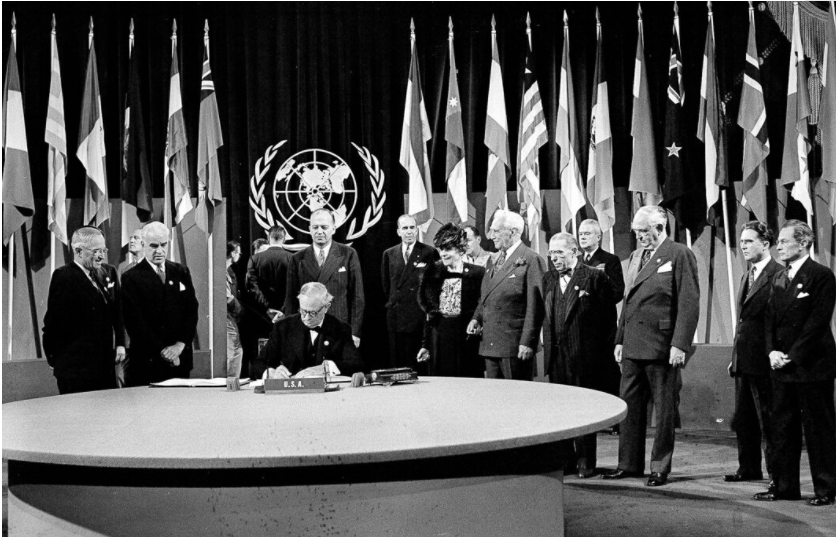
Image credit: AP
Universal Declaration of Human Rights (UDHR) constituted the second important foundation of the post-second World War order, which integrated civil and political rights, economic and social rights, and solidarity rights. Over time, developed countries in the west drew a sharp line between civil and political rights and economic and social rights, including solidarity rights. They used civil and political rights as weapons to interfere in less powerful countries, especially targeting the socialist countries. The American invasion in the Korean peninsula with a longer goal to demolish the newly founded People's Republic in China was the initial breakdown of international human rights law.
The UDHR stressed integrating civil and political rights, economic and social rights, and development rights, also called solidarity rights, as the second pillar of the new world order. As Mary Ann Glendon, a Harvard Professor of Law stresses, the UDHR intended to elevate the economic and social rights to fundamental rights, which the Western developed countries seriously objected to, thus helping to perpetuate global poverty. The pillar of global equality is thus broken.
The third pillar was the Bretton Woods system which sought to regulate the markets so that economically rich Western powers would be stopped from practicing a protectionist financial market policy and exploitative economic globalization, marked by their protectionism and monopoly.
The Western capitalist military powers have gravely weakened, if not destroyed, these three pillars. The world order is thus facing a chaotic situation. But the Western military powers are keen to use this chaos as an excuse for propelling another cold war. They are trying to establish the China-economic-rise-threat theory as a menace to world security and development. This is purportedly coined to delude the world. It is nothing but an excuse to plunge the globe into another cold war, thus benefiting from arms markets.
These three pillars of the new world order emerged as closely integrated, conceptually, in fact. In the view of Noam Chomsky, the thinking behind them illustrates this fact, so does their interaction over the years. Sometimes, the integration and interaction of these three pillars worked and generated a hope that the world is not going to suffer the same fate during the World War II.
But not long after, principles instilled by the UN Charter, in the words of Chomsky, 'created distaste to the Western developed countries who were in a position to construct and shape, and guide the affairs of the world order.' They quickly took steps to dismantle those lofty principles. These steps are evident in the US interference in Chile, resulting in President Salvador Allende's killing and Pinochet's rise, the assassination of President Sukarno and installation of military regime in Indonesia, the American invasion in Vietnam, Afghanistan, Iraq, and Libya to mention a few. The distaste of the Western powers, mainly the US, continues even today. It largely falls in Asia in the form of the formation of QUAD and Indo-pacific strategy and the bigger naval presence of the US and its allies in the South China Sea. The anti-China propaganda intended to manufacture anti-China opinions is increasing.
The US invasion of Afghanistan in the past and its present withdrawal are nothing but parts of its broader policy to keep prevailing over the affairs of world order. And, as such the activities form a source of the rising chaos in international affairs. The US declaration of the ban on Hong Kong authorities' visit of America is a part of the deliberated plan of fanning the flames. Therefore, world peace is seeing gloomier prospective rather than inclusive cooperation. The American containment policy of China seems to be turning rapidly into an encirclement policy. Western media has been orchestrating false blame of human rights violations in Xinjiang. In the East, the American presence in South China Sea is becoming more provocative. The withdrawal from Afghanistan should not be viewed in isolation, therefore.
Why sudden invasion and sudden withdrawal from Afghanistan?
The US is slated to completely withdraw its military forces by the end of August. President Joe Biden said that he was advised to do so by his military advisor. He also said that the force had gone to Afghanistan to build the state. He added, 'The force had gone to bring Osama Bin Laden to justice, and that has ended now.' The Afghan employees helping the US forces in Afghanistan in works like translation and interpretation will accompany the US troops home. Their families are provided the privilege of a special immigration visa. Biden said, "When we made this decision (force withdrawal) at the end of the military involvement, I judged it is not in the national interest of the United States of America to continue fighting in this war indefinitely."
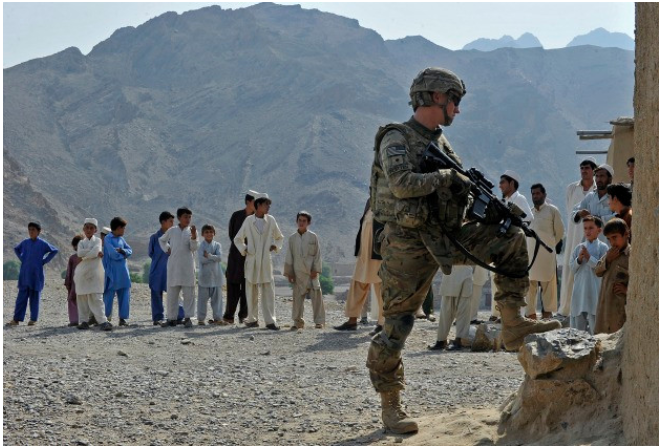
Image credit:TAUSEEF MUSTAFA/AFP/Getty Images
If so, why the US invaded the country in the first place? In fact, the US wanting to ensure peace in Afghanistan is mere guff. Its' interest was purely strategic and it miserably failed. This withdrawal may actually affect the situation in south Asia. If not militarily, the American presence in south Asia would be significantly intensified. And Nepal will be a chosen place for its south Asian affairs.
Is Nepal competent to handle it? The internal division in UML and the deposing of the Oli government has shown that Nepal is neither competent nor prepared for handling such affairs. Oli government's friendship with Americans went disastrously wrong. His finance minister Yubaraj Khatiwada's insistence in endorsing Millennium Challenge Compact (MCC) generated apathy of the Nepali people to Oli government. While circumstances did not allow the government to endorse MCC by the Parliament, the eventual consequence is fatal. The Western power bloc succeeded in transferring the power in Sher Bahadur Deuba, a good friend of the West.
The abrupt American decision to withdraw from Afghanistan raises several questions, apart from the flawed policy of the military intervention. What constituted the US national interest to fight a war 20 years ago? Did its self-portrayed values of democracy drive that military intervention? Did the help of so-called American exceptionalism justify that? Do democratic values concern the Unlisted States? A single word will largely answer these questions. The word is 'hypocrisy.' In the words of David Runciman, '…the word hypocrisy, though inherently unattractive, is also more or less inevitable in most political settings, and in liberal democratic societies, it is practically ubiquitous.'
Undoubtedly, in American politics, the liberal democracy is ubiquitous, as its founding fathers claim. It means that hypocrisy stays in liberal democracy as a dear spouse. Hence, twenty years ago, the military intervention in Afghanistan was of a paramount national interest, but not now. Earlier, Judith Shaklar, in her book Ordinary Vices (1984) wrote: Hypocrisy forms one of the major threats in a liberal society. She also said that the vice that emerges as the worst of all, and by far, is cruelty. Cruelty is a regular outcome of the foreign policy that defines national interest capriciously. The national interest is abusively used to validate the illegitimate interests of rulers.
Runciman argues, pointing to this reality, "The specific political problem (of today) is that liberal societies are, or have become democracies." What is prevailing in such democracies as paramount is the hidden or selfish interests of the political elites. Understandably, Bush's interests had been served by sending military forces to Afghanistan. It would make him and Tony Blair the messiah of anti-terrorism. He had hardly any other issues in politics. Hence, the entire state machinery and media had been used to manufacture the consent of the American public, in the words of Noam Chomsky, which is very rarely informed of what its government does out of America. Now, withdrawal serves the interests of Joe Biden to stand his political ground.
The cruelty associated with this hypocritical politics is unimaginably bigger. Thousands of Afghan people have lost their lives. The so-called war against terror has devastated peace and national spirit of the Afghan people. Their economy is destroyed. Their education has collapsed. Society is sharply divided. The Taliban, once the terrorist enemy, has now ceased to become the enemy. In Biden's opinion, staying one more year in Afghnaistan is meaningless because staying further is not going to solve the problem.
Of course, American policymakers knew even 20 years ago that American military intervention would not resolve the problem. The US was allegedly in Afghanistan to solve its crisis but that was a big lie. The real intention was to build control or leverage in Central Asia, Eurasia, in the perspective of the demise of the Soviet Union. And, after that, to encircle China from the West, keeping China into the bracket of Central Asia and the South China Sea. Offensively containing China was the sole interest behind military intervention in Afghanistan.
The US loss in Afghnaistan is huge. After Vietnam, America has faced another humiliating defeat. American defeat in Afghanistan unequivocally shows that the world is against bullying. In 20 years, US war was nothing but competition for killing people. Its indiscriminate bombings killed many children and old people in the pretext of the fight against terrorists. Most importantly, its policy of installing its favourable people in power also miserably failed. Past and incumbent presidents of Afghanistan, Hamid Karzai and Asdhraf Ghani, had been American green card holders and were elected on the strength of media propaganda and the American Army. Their position in Afghanistan was limited, no more than mayors of Kabul. They knew nothing of Afghanistan.
Following the regime change, America has never promoted democracy. Either it has installed dictators or its puppets. In Indonesia and Chile, it installed military dictators by overthrowing democratically elected governments. In Afghanistan, it brought Americanized Afghans to assume power, who never had any political background. The flaw in American policy is crystal. It always thinks of regime change and control; it does not think of government after occupation and democracy and welfare. For it, democracy is not a value but a strategy.
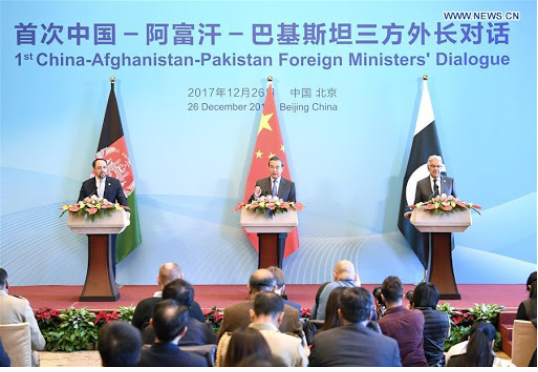
Image credit: Xinhua
The defeat of America in Afghanistan might also be a problem for Pakistan and China. Islamic fundamentalism may raise its head both in Pakistan and China. Fundamentalists are operating near China's Xinjiang. The Western bloc is uninhibited to use terrorists and extremists against China. For some conservatives in the West, terrorist acts or rebellions against China becomes a democratic or freedom act. After withdrawal from Afghanistan, Western anti-China forces may use Islamic extremists infested within the Taliban against China. They may target India either, considering Indo-American closer ties recently. Iran may also face a similar problem. Hence, China, Iran, and Pakistan can tame the Taliban as a responsible political element. India may join hands too.
Impacts of American withdrawl from Afghanistan in south Asia
The effort of creating in Afghanistan a formidable military base to control Eurasia and contain China was a fully flawed security strategy of the US. It lost Pakistan, which pleased India most significantly. Indian foreign policy strategists had been pleasantly happier to isolate Pakistan from the US and cause trouble in Baluchistan. But Pakistan gained a lot from economic collaboration with China, thus rescuing its troubled economy. Eventually, Pakistan's say in Afghanistan will be strengthened, thus causing a disadvantage to India.
An impractical foreign policy of Indian thinkers and leaders will eventually end India's free access to Central Asia via Afghanistan. The prospect of a 'petrochemical and gas line' linking with Iran will be the unfulfilled dream of India. Had India mooted a policy of Asian partnership theory and developed economic investment partnership through the BRI framework with China, the prospect of petro-gas pipeline project would have succeeded to bring Afghanistan, Pakistan, Iran, India, China, and Russia in partnership. One of the perennial problems of conflict in Asia would have gradually disappeared.
How India will react to this withdrawal is not clear. How does the US compensate for the loss of the Afghan base is not clear either. What impacts will fall upon the US-India relations in the future is also not fully clear. Yet, the questions generate many speculations. One of them is that the US will more strongly show its presence through the Indo-pacific strategy. Maybe, it will accelerate the campaign of materializing the Quad. These outcomes will largely depend on Biden's assertiveness, which is somehow unlikely due to the US's adversely affected economy by the Covid-19 pandemic, the increased social tension in the population between the White-European race and the rest. Most importantly, the failure of distorted capitalism is tremendous. Corporatism has subdued American society.
Presumably, the US-India alliance will grow much stronger in the days to come. It implies that the Indo-US leverage in Nepal will be heightened. Three major factors are helping us to speculate this result. Nepal's territory is vital for both the US and India for implementing an offensive China containment policy. For America, Nepal is now an inevitable choice. The validity of the argument lies in the relentless insistence of the US government to implement the Millennium Corporate Compact. The priority of the US government to implement this project is also manifested by Nepal's first majority communist party government's insistence to endorse it.

Image credit: MCC.com
PM KP Oli's government was keen to get the MCC agreement ratified by the parliament. Its finance minister signed the operation agreement, which added some objectionable provisions that stirred a bigger debate. First, the communist government headed by Oli gave priority to the MCC project, thus setting aside the BRI Framework Agreement and several bilateral investment and cooperation agreements signed during the Chinese President Xi Jinping's visit to Nepal in 2019. Low interest in taking Nepal's existing relations with China into a strategic level, as it was agreed during Xi's visit, is a success of the recent Indo-American influence in Nepal.
Second, the MCC crisis in the Parliament of Nepal had many political bearings. Initially, it appeared in the removal of Speaker Krishna Bahadur Mahara. His removal was strategic. This removal led to a serious political cleavage between PM Oli and Party President Pushpa Kamal Dahal "Prachanda" concerning the appointment of the new speaker. In reaction, Prachanda and Madhav Nepal rejected to ratify the MCC agreement, following the recommendation of the JN Khanal Committee to probe the impacts of the MCC. The fight developed critically. In retaliation, PM Oli dissolved the Parliament, thus removing the hurdle of ratifying the MCC agreement; the agreement was then implemented without Parliament's ratification. The present scenario is obvious. When the Supreme Court reinstated the dissolved Parliament, another judgment annulled the unity agreement of the two communist parties, thus fully smothering the communist politics of Nepal. The consolidating Indo-American influence gained momentum and succeeded in pushing the communist political force into the corner.
Third, in this whole context of defiling communist politics, a tendency of rightist political elements mushroomed. The communist government lost its image, also gravely obliterating the entire image of communist politics in Nepal, which had evolved in the last seven decades. However, this outcome was not abrupt. The outcome was a cumulative result of several factors woven into precisely strategized Indo-American influence imbued in Indo-Pacific strategy.
Is Nepal favoring tilt towards the West?
The journey of PM Oli's government in this direction began immediately after taking power. The first controversy was generated by the US visit of Foreign Minister Pradeep Gyawali who had an extensive talk with the US Defense Secretary. After his return, the US Department of Defense published a report on 1 June 2019 stating Nepal as a part of the Indo-Pacific strategy. The report sparked several comments in Nepal. However, Minister Gyawali did not challenge the truth of the report, though he ruled out that Nepal had become a partner in the Indo-Pacific strategy.
Interestingly, the same report categorically stated that the US Indo-pacific military command had held two meetings with the government of Nepal concerning the Nepal Army's involvement in the Indo-Pacific Land Army. The Oli government did not object to this report. Minister Gyawali's US visit and Defense Department's June report proved communist government's tilt towards Western bloc, the US in particular.

In 2019, a mega-investment conference event was sponsored by Nepal in which huge money was spent. The communist government's Finance Minister emphatically stood in favour of the neo-liberal economic policy. His fiscal budget fully ruled out the Constitution's commitment to construct 'a socialism-oriented society.' The fiscal budgets had been bitterly criticized for their anti-agriculture and agro-based industrialization. Eventually, it became public that the MCC agreement he had signed had given exclusive power to a committee to implement this project by giving unlimited overseeing and monitoring power to the US agency responsible for MCC funding. The communist government ostensibly slowed down its efforts to several agreements with China, including establishing the Himalayan corridor.
Is there any relevance or relation between the critical political chaos of Nepal and the US withdrawal from Afghanistan? No concrete proofs are available to show the connection. However, Nepal's recent governments, headed by Nepali Congress and Communists both, have received the support of India and America. Most importantly, this is a rare happening in which the American government was happy even with a communist government.
This situation leads to two arguments: Either the U.S. government has changed its conservative attitude or opinion to Nepali communists and began to accept them as liberal democrats, or Nepal's communist party is no longer a communist party, ideologically. At least, the logical consequence is that at least the Western bloc regards Nepal's communist party government as a normal liberal government.
The reasons might be several but one them is that 'the communist government accommodated many persons, who in the past had engaged in the NGOs funded by the Western agencies, into government positions. Such appointees, being very friendly to the Western countries, played, probably, catalytic role to generate the Western government's support to Oli government. Most of these appointees had been favourites of Western countries, particularly the US. This policy is strategic, indeed.
In many countries, America in the past has planted a leader who had been Americanized. One day, it would not be surprising if a leader is exported in Nepal from India or America—an NRN man can be sponsored as a leader of Nepal. The political chaos resulted from the game of dissolution and restoration of the House of Representatives, the ouster of the communist government, induction of opposition leader as prime minister, and countless setbacks in communist politics may push Nepal in that direction.
Attempts of Oli's cabinet to cause a paradigm shift in Nepal's political and economic affairs occurred as a major problem. A wrong assumption inspired the paradigm shift, namely reliance on the West would help Nepal save itself from the trap of preemptive conflict between China and India. This theory was entertained by King Mahendra before the Khampa rebellion using Nepal's territory against China. India has rapidly moved towards an alliance titling to the West. It will mean detour from the earlier policy of friendly relations with China.
Taking the West as neutral power in Nepal's geopolitics is a product of immature or naïve thinking. This wrong assumption led the Oli government's foreign policy to ignore the BRI framework agreement while favouring MCC which contains controversial provisions, potentially affecting Nepal's national interests. In the beginning, his government demonstrated quite an assertive approach and promisingly assured people of a better future. However, the approach suffered setbacks once it showed an inclination to the West through its foreign Minister's orchestrated visit of America, which allegedly included dialogue, among other things, regarding Indo-pacific strategy. Nepali media blasted the visit once the US report claimed Nepal as a part of the Indo-pacific strategy. The report certainly described Nepal's Foreign Minister Gyawali's visit as a new beginning of the relation between Nepal and America.
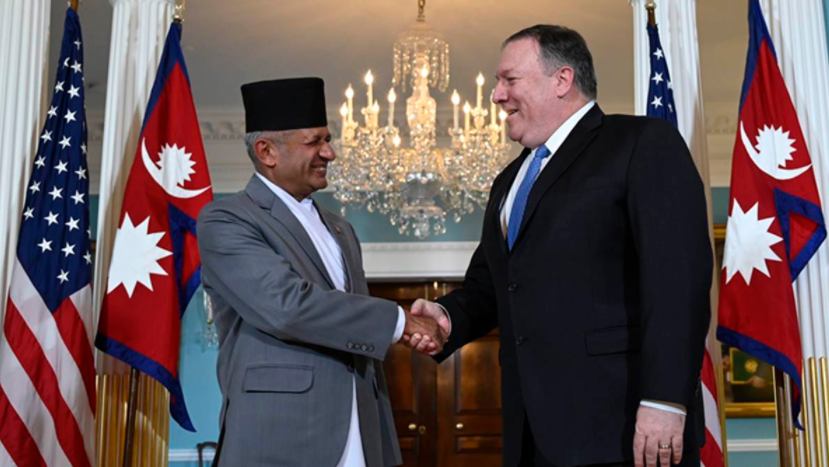
The implicitly proposed plan for a paradigm shift in foreign policy, departing from relying on two big neighbours to the West, was seen as unrealistic shortly. One of the errors of this proposed paradigm shift was its conceptual irrelevance to Nepal's geopolitical situation and traditional relations with its big neighbours. The plan for a paradigm shift was inspired by a false hope that the Western countries would pour money into Nepal's development affectionately.
This hope is proved otherwise in the past. From the 1960s to the 2010s, the Western donor agencies and international organizations contributed Rs. 268 billion, insignificant for over 60 years. Approximately 50 percent of the amount was loan. A greater part of this assistance allegedly went to the social sector reform, and only 4 percent is earmarked to the development of agriculture. Twenty-two percent of the amount is supposedly spent on education but in vain; the quality of education is grossly poor even today. Nepali society saw massive breaks in its mosaic of cohesion due to cracks created by social sector reforms activities. The assistance was visibly counterproductive, ending at the so-called federal structure.
Due to unrealistic stress on Western investment and assistance, Oli government emphasized reconstruction and revisiting Nepal's relations with Western countries, the US and the UK particularly. Improving relations with West using forums like Davos was significantly stressed. This utopia was significantly generated by Nepali diaspora and NGO leaders. They ballooned the majority communist government's ambition of receiving bigger investment. Consequently, an investment conference was organized in Kathmandu in 2019, spending a huge amount of cost, in which China and other Asian countries were ignored. The Chinese delegation was even not given the presence on the podium. The DFID and USAID obtained highlighted presence. This detour in foreign policy ignored Nepal's need to transform its geopolitics into geoeconomics. Only a policy that favours building trilateralism in cooperation will achieve the goal of geoeconomics, which was adequately reflected by Chinese President Xi Jinping during his Nepal visit. On the contrary, the pro-Western tilt generated an unwanted situation of the MCC versus BRI agreement.
The concept of the Western bloc's neutrality was a well-practiced strategy by king Mahendra during the 1960s. In the given situation generated by the non-aligned movement and solidarity of newly independent countries, he successfully attracted Western support to Nepal. The emergence of China as a communist country had attracted the interest of the West to Nepal as it would be helpful to contain China. Nepal was seen as a better place to observe developments in China.
But King Mahendra had hardly any options because China and India both were poor and unable to support Nepal's development at that time. But the present situation is quite different. Both China and India are economically powerful and play a significant role in international politics and affairs. This new development can potentially be harnessed to accelerate Nepal's economic development, particularly by attracting Chinese investment. Nepal can enhance its diplomatic capability to forage out trilateralism in many areas of investment, such as trilateral tourism business, energy, infrastructure development projects, and agricultural products.
Trilateralism requires Nepal to keep and flourish the principle of equi-closeness to China and India. Equi-closeness in economic cooperation requires the application of the principle of political distance with both. Only then the prospect of trilateralism will be strengthened. But the paradigm shift to the West will impact the prospect of both the principles of economic equi-closeness.
Only balanced relations with neighbors and diplomacy for trilateralism are safe for Nepal
In the past, Nepal had to deal with economically backward and politically less influential big neighbours. Until the early 1990s, both China and India were struggling to boost their economies and were less influential in international politics. Understandably, Nepal had to deal with economically and politically weaker neighbours. But the situation is now diametrically changed—China and India are now influential powers, able to impact world politics. Nepal's situation economically and politically is hardly changed, however. After the last general election, Nepal obtained an opportunity of having a stable communist-party government. It had a better position to push the idea of added investment from China and India and pursue diplomatic endeavours to promote trilateralism in business and investment. Oli government overlooked this potential and opportunity. The government adopted a policy of avoiding the challenging task of balancing relations with neighbours and chose to rely on World Bank-driven investment and closeness with Western countries.
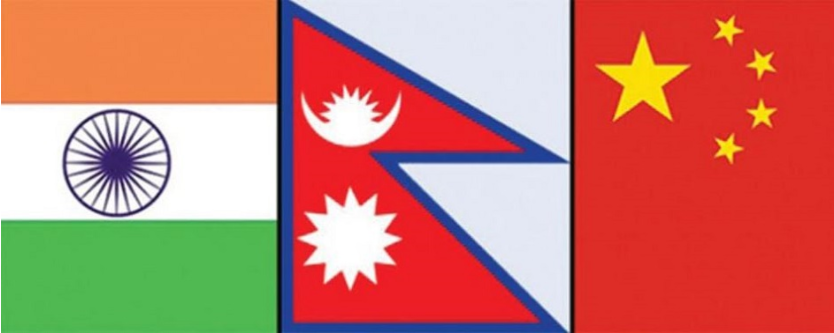
It was a mistake. This shift resulted due to the calculated move of some people who ignored to observe China's economic and financial influence in the global economy. Most of these people were pseudo-communist economists and planners, heavily influenced by the neoliberalist approach. The eventual consequence was disastrous. The pro-active business relations and diplomacy with China have been largely affected by that shift. India has come pervasively but saliently within Nepal's politics. Efforts to plant Hindutva in Nepal's politics are mushrooming.
Situations facing Afghanistan and Nepal are coincidental but not unrelated. The similarity is a markedly bigger possibility of political instability in both countries in the future. The root of instability lies in big power's political interests. America is now withdrawing from Afghanistan with an intense possibility of conflict, which will impact the balance of politics in entire south Asia, including China. America will prioritize Nepal to monitor China and India as one of the strategies of containing China and subduing India.
American stress on the MCC model of cooperation is an example. The agreement has sought perpetual copyrights on project items, designs, equipment, technology, and properties attached to the construction. The project agreement avoids Nepal's jurisdiction on crimes committed by the foreign project staff and declares that the employees should not necessarily be Nepali nationals or citizens. Most importantly, the MCC Nepal Board, created under the Nepal Development Board Act, has the power to refuse government instructions, decrees, and suggestions. The agreement says that 'the MCC Board shall bind the government to agree on decisions taken by it.' Most importantly, the MCC Board Nepal is subject to the authority of MCC Board America. The agreement is thus unequal.
The shift in traditional balance theory may be a source of political instability in Nepal. While India may be happy temporarily, it might affect India-Nepal trade and business policies later. Since the agreement follows free market and economic liberalism, it contradicts the Constitution's goal of orientation to socialism. The agreement protects NGOs and commits Nepal to refrain from regulating NGO affairs by making laws. This policy will eventually breed a governance system that seeks NGOs to replace the state's authorities.
Some people have argued that the present governments' failure in diplomacy is the gravest in Nepal's history. One of the most severe failures relates to the 'lack of interest to save the SAARC.' Nepal is an incumbent Chair of the organization, which, according to rule, is to shift to Pakistan after the summit. Unfortunately, the summit could not happen at the designated time. Nepal's efforts to diplomatically pursue the issue and generate an environment conducive to the resumption of the summit was lacking. Nepal's activism is fully absent. The loss of SAARC is severely bad for countries like Bangladesh, Bhutan, and Nepal. Failure to convince India to sit for negotiation concerning the Kalapani issue is another failure. Uncertainty of Tibet-Nepal high-speed railway despite too much talk during the elections is also problematic. Many big projects are incomplete or could not come into operation at all. These results are due to the ill-advised paradigmatic shift in diplomacy.
Published on 9 August 2021